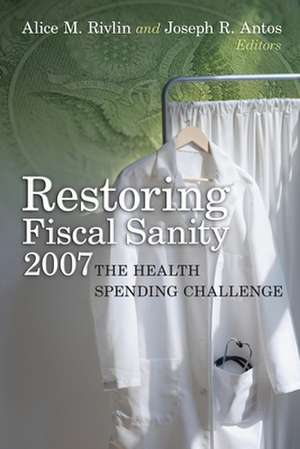Restoring Fiscal Sanity 2007: The Health Spending Challenge
Editat de Alice M. Rivlin, Joseph R. Antosen Limba Engleză Paperback – mar 2007
Exceeding $2 trillion annually, health care spending in the United States is growing significantly faster than the national economy. If left unchecked, this health spending crisis will threaten Americans' ability to pay for other essential services. Driven primarily by the cost of benefits promised to seniors under Medicare and Medicaid, federal health expenditures will force lawmakers to make stark policy decisions. In this third volume of Restoring Fiscal Sanity, policy experts suggest ways to slow the growth of federal spending on health care. Unless federal health spending can be brought under control, Americans will face substantially higher taxes, sharp reductions in other government programs, and cuts in benefits to the elderly. Families, businesses, and communities will be forced to make agonizing choices between health care and other needs. Focusing on policies that do not shift costs to the states or the private sector, the authors of Restoring Fiscal Sanity 2007 suggest reforms in federal programs that have the potential to reduce the growth of spending for the entire health system, increase the efficiency and effectiveness of the care provided, and enhance health outcomes. Drawing on years of government and public policy experience, they stress the need for innovative approaches and cooperation between the private and public sectors.
Preț: 198.35 lei
Nou
Puncte Express: 298
Preț estimativ în valută:
37.96€ • 39.48$ • 31.34£
37.96€ • 39.48$ • 31.34£
Carte tipărită la comandă
Livrare economică 14-28 aprilie
Preluare comenzi: 021 569.72.76
Specificații
ISBN-13: 9780815774938
ISBN-10: 0815774931
Pagini: 233
Dimensiuni: 152 x 229 x 13 mm
Greutate: 0.33 kg
Ediția:2007
Editura: Brookings Institution Press
Colecția Brookings Institution Press
ISBN-10: 0815774931
Pagini: 233
Dimensiuni: 152 x 229 x 13 mm
Greutate: 0.33 kg
Ediția:2007
Editura: Brookings Institution Press
Colecția Brookings Institution Press
Notă biografică
Alice M. Rivlin is a senior fellow in Economic Studies at the Brookings Institution and visiting professor at the Georgetown Public Policy Institute. She has been director of both the White House Office of Management and Budget and the Congressional Budget Office, and has served as vice chair of the Federal Reserve Board. Among her previous books is Beyond the Dot.coms: The Economic Promise of the Internet (Brookings, 2001), written with Robert Litan. Joseph R. Antos is the Wilson H. Taylor Scholar in Health Care and Retirement Policy at the American Enterprise Institute. He has also served in senior positions at the Congressional Budget Office, the U.S. Department of Health and Human Services, the Council of Economic Advisers, and the Office of Management and Budget.
Descriere
Exceeding $2 trillion annually, health care spending in the United States is growing significantly faster than the national economy. If left unchecked, this health spending crisis will threaten Americans' ability to pay for other essential services. Driven primarily by the cost of benefits promised to seniors under Medicare and Medicaid, federal health expenditures will force lawmakers to make stark policy decisions. In this third volume of Restoring Fiscal Sanity, policy experts suggest ways to slow the growth of federal spending on health care. Unless federal health spending can be brought under control, Americans will face substantially higher taxes, sharp reductions in other government programs, and cuts in benefits to the elderly. Families, businesses, and communities will be forced to make agonizing choices between health care and other needs. Focusing on policies that do not shift costs to the states or the private sector, the authors of Restoring Fiscal Sanity 2007 suggest reforms in federal programs that have the potential to reduce the growth of spending for the entire health system, increase the efficiency and effectiveness of the care provided, and enhance health outcomes. Drawing on years of government and public policy experience, they stress the need for innovative approaches and cooperation between the private and public sectors.

















